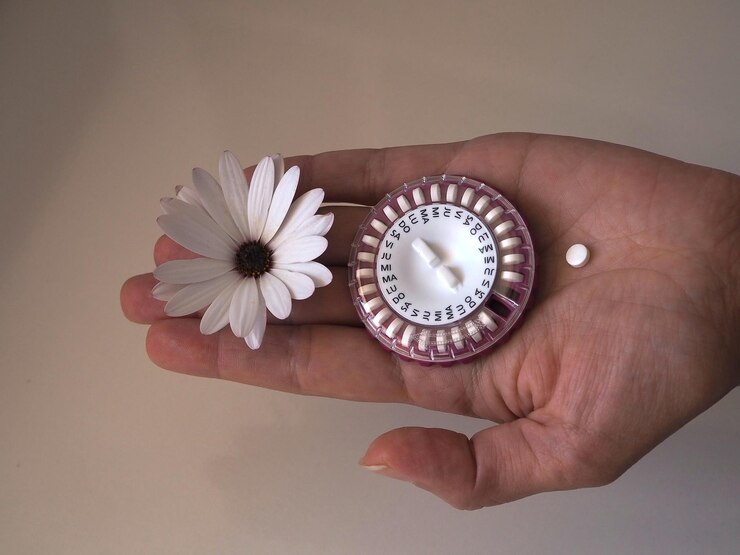What is progesterone?



The hormone progesterone is an active steroid concerned majorly with reproductive health. Present in both men and women, the progesterone hormone is better known for its role in a woman's overall health, especially her reproductive health.
Chemically, progesterone is a steroid hormone that's derived from cholesterol. The term progesterone is derived from the Latin word 'pro gestationem', implying the role of the hormone in facilitating and maintaining pregnancy.
Progesterone is majorly produced by the gonads, i.e., the ovaries and the testes. It is also secreted in small amounts by the adrenal glands, which are small triangular-shaped glands attached at the top of your kidneys. In the brain, the release of Gonadotropin-releasing hormone (GnRH) from the hypothalamus stimulates the secretion of follicle-stimulating hormone (FSH) and luteinizing hormone (LH) from the pea-sized pituitary gland, which is situated at the base of the brain.
The FSH and LH secretion results in the development of the egg-releasing follicle present in the ovary. As the egg matures, the developing follicle secretes the hormone oestrogen and progesterone into the body. Apart from the ovaries, testes, and the adrenal gland, progesterone is secreted by the placenta and the brain.
Progesterone is also known as a sex steroid hormone and plays a vital role in maintaining a woman's reproductive health. The menstrual cycle, conception, maintenance of pregnancy, and the growth of the developing foetus are all significantly dependent on progesterone.
The role of progesterone in the menstrual cycle is primarily concerned with the luteal phase, i.e., during the second half of the cycle. Your menstrual cycle may be divided into four phases, namely, menstruation, follicular phase, ovulation, and the luteal phase.
The uterine lining sheds in the form of your monthly menstruation during the menstruation phase. This phase usually lasts for a period of 3 to 7 days.
This phase lasts up to the 13th or 14th day of your cycle. Usually, only one or sometimes two of the follicles mature to release the egg during each menstrual cycle. This is characterized by a surge in the FSH and LH towards the end of the follicular phase. The developing follicles begin to release oestrogen and progesterone hormone that result in the thickening of the uterine lining.
The surge in your luteinizing hormone is followed by ovulation, i.e., the release of the egg from the ovary. This phase usually occurs during the middle of your cycle, around day 14 or 15. Ovulation may last for a period of 16 to 32 hours.
This phase is characterized by an increase in progesterone hormone. After the egg is released from the ovary, the empty follicular sac transforms into what is called a corpus luteum. The corpus luteum continues to release progesterone hormone, which prepares the uterus for pregnancy. The uterine lining continues to thicken under the influence of the progesterone hormone. If the egg is fertilized, the corpus luteum continues to secrete progesterone, if pregnancy does not occur, the corpus luteum undergoes atresia and your progesterone levels begin to drop.
Progesterone is essential for conception as it helps to increase the thickness of the uterine lining and thereby facilitates the process of embryo implantation and conception.
Progesterone continues to be an essential hormone during pregnancy, especially during the first trimester. The corpus luteum releases the hormone progesterone for the first 10 weeks of pregnancy, after which the placenta takes on the function of secreting progesterone.
Also known as the pregnancy hormone, progesterone maintains the uterine lining throughout pregnancy, prevents further ovulation as well as prevents lactation during pregnancy. It thereby helps to create an environment conducive to the growth of the foetus.
Progesterone is also known for its role in the development of the mammary gland to support the production of breast milk.
Progesterone seems to have a neuroprotective function essential in maintaining the health of the brain, cardiovascular system, and bones.
Low levels of progesterone have been associated with the following symptoms and health conditions:
Amenorrhea
Irregular Periods
Miscarriage
Ectopic Pregnancy
Preterm labour
Stillbirth

In case you are suffering from symptoms of low progesterone, your doctor may advise you to take a serum progesterone test to evaluate your serum progesterone levels.
In addition, you may consider taking a Welzo Hormone test that would test your FSH, LH, Testosterone, Oestradiol, Thyroxine (T4), Thyroid stimulating hormone (TSH), and Sex Hormone Binding Globulin (SHBG). Checking your hormones and maintaining them at an optimum level is essential to good reproductive health.
Post-menopause <0.401
Hormone therapy in synthetic or natural progesterone is prescribed for persons with low levels of progesterone. Often your doctor may prescribe a combination medication containing both oestrogen and progesterone.

Progesterone therapy may also be prescribed in the form of topical creams, which may be applied to your arms, wrist, or stomach area.
Progesterone hormone therapy has benefits in the treatment of endometriosis, certain types of cancers, excessive menstrual bleeding, and weight management.
Oral progesterone is considered more effective in raising your progesterone levels as compared to topical progesterone creams.
Your doctor may also recommend increasing your consumption of food items rich in supplements like magnesium and zinc, which would help to improve your progesterone levels. Whole grains, seeds, nuts, and vegetables like cabbage, cauliflower, beans, and spinach.
To continue reading about progesterone, see our article on symptoms of low progesterone.
Plus get the inside scoop on our latest content and updates in our monthly newsletter.